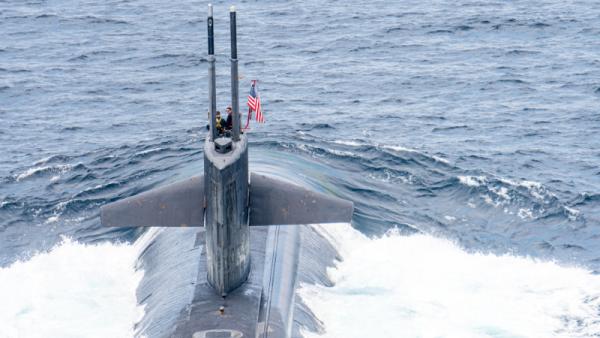The Mariner 4291 / Shutterstock

Wanning Sun, Deputy Director, UTS:ACRI; Professor of Media and Communication, Faculty of Arts and Social Sciences, UTS |
This article appeared in Crikey on December 7 2023.
A draft bill intends to make it a criminal offence to supply regulated technologies to foreigners without a permit, with the exception of the United States and the United Kingdom. Should this bill be passed, Australian researchers could face jail if they collaborate with or share their scientific expertise with certain others, both in Australia and beyond. It’s clear this is designed to protect the secret technologies developed under the AUKUS pact from being stolen by nations such as China and Russia.
This has sent a chill down the spines of many scientists in Australian universities, who rely heavily on international collaboration. ANU Professor Chennupati Jagadish, a specialist in nanotechnology and semiconductors, is alarmed by the likely ramifications of the proposed bill for his research team. Sharing his concern, ANU Professor Alan Gamlen asks whether AUKUS is ‘worth the cost’ if it means closing down collaboration with countries like New Zealand ‘in order to get new submarines’.
On the other hand, many tertiary education managers and university administrators have been quick to jump on the AUKUS bandwagon. Hot on the heels of Labor’s confirmation of the pact in March this year, the CEO of Universities Australia, Catriona Jackson, boarded a plane bound for Washington DC to promote the ways our universities can support the delivery of AUKUS. Jackson told the ABC she wanted to talk to the American universities and security agencies to ensure Australian universities were ‘putting in the early work and the quick work to make sure we’ve got the workforce for AUKUS’.
Vicki Thomson, the chief executive of the Group of Eight universities, lost no time in suggesting that universities should ‘put tall fences around small paddocks’ to protect AUKUS-related secrets, although to her credit she did qualify this by adding, ‘but not at the expense of broader research collaboration’.
University administrators are also on standby. As early as November 2022, presumably fearful of missing out on the AUKUS-related ‘gold rush’, ANU’s vice chancellor Brian Schmidt was already talking up his university’s eminent suitability as a training ground for an AUKUS-related workforce. He flagged the option of ‘degree programs … tailored specifically for AUKUS priorities’, saying: ‘We cannot afford to drag our feet on this.’
Such responses raise crucial questions about the nature of the university as an institution. Can we still see universities as places to learn and produce knowledge that, at the risk of sounding naïve, is for the greater good of humanity, independently of transient geopolitical skirmishes? Can researchers and students still assume that universities are dedicated spaces where academic freedom is guaranteed?
Professor Louise Edwards, a prominent China historian, notes how the current xenophobia towards China is leading to several worrying trends in our universities: the decline in collaborations with China-based scientists; the failure of scholars working on China to win a single grant in the current round of Discovery Projects funded by the Australian Research Council; and the decision by many scholars to practise self-censorship, for fear of insinuations of spying for a foreign country.
In the meantime, humanities disciplines are in decline. Angry about the recent sacking of high-powered humanities scholars such as historians, philosophers and medieval studies experts at the Australian Catholic University, Professor Graeme Turner laments that humanities academics are becoming ‘expendable … due to the logics of the market’, despite being a ‘central national resource’ whose research is ‘fundamental to a civil society’.
If humanities scholars are fundamental to civil society, then both the previous and current governments apparently see little value in preserving and nurturing such a society by prioritising the training of future humanities scholars.
More than a year into its government, Labor is raising hopes that it may at some stage reverse the Coalition’s fee structure, which more than doubled many humanities degrees. But Labor’s disagreement with the previous government was along the lines of jobs and job-readiness. In fact, neither Labor nor the Coalition seem to see much value in teaching students how to think critically, assess evidence logically, and participate in public debates with open and creative minds.
If one is cynical — and it is hard not to be at this point — one may wonder if both the government and some universities see the gradual decimation of the humanities as a blessing in disguise, as it may effectively help advance the government’s AUKUS agenda, while also deflecting criticism from those university administrators who are embracing AUKUS.
After all, bereft of historical knowledge, some critics of AUKUS may not be able to argue convincingly that our universities are repeating what took place on campuses in ‘Cold War I’ only a few decades ago. And, without the analytical language to make effective critiques, it may be hard for such critics to demonstrate how politicians manipulate the language of ‘national interest’ to push their security agenda, especially in relation to China.
Without the benefit of philosophy and political theory, a debate about the moral and ethical dimensions of AUKUS or the politics behind the government’s security agenda would be severely impoverished. The health of our democracy depends on our universities continuing to have academic freedom.
The history of universities during the first Cold War era tells us that it is precisely at times such as this that our government and our universities need to fight tooth and nail to preserve the precarious civil society that has taken millennia to construct.
Author
Professor Wanning Sun is Deputy Director at UTS:ACRI and a Professor of Media and Communication in the Faculty of Arts and Social Sciences at UTS.


